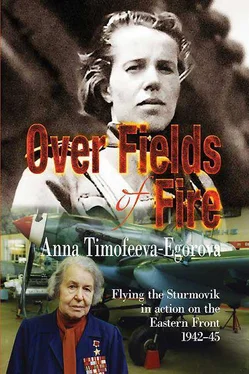Ivan had been absent from the regiment for ten days and when he came back for some reason he did his best to stay out of my sight. “What’s the matter?” I wondered and decided to ‘interrogate’ Boris Strakhov. Borya was somewhat hesitant and then said:
“You know, it’s a very delicate matter. Please don’t tell anyone…”
It appeared Ivan had made it home but his girlfriend had just left for the front. Their wedding didn’t happen. When his vacation was over his town-folk presented him with a three-litre bottle of samogon 127 127 Translator’s note — home-made liquor or ‘moonshine’.
, a gift for his comrades, the frontline airmen: “Don’t be precious, everything we own is yours…” Ivan saved the huge bottle all the way back, having wrapped it in my ‘special’ trench-coat. He had to hitch-hike from Krasnodar to the aerodrome, and when he was doing the last leg of his trip the driver shook his passengers so much that all of them flew out of the back of the truck and hit the ground hard. Everyone was alright, and only Ivan suffered: his cherished three-litre bottle was smashed. Of course, the strong home-made drink soaked the trench-coat. Ivan washed it after he came back to get rid of the smell of spirits and hung it out to dry somewhere outside the stanitsa , among the vegetable gardens. “As soon as it gets dry, he’ll iron it and bring it back to you”, Boris finished earnestly, and it suddenly made me laugh: I had imagined Ivan flying out of the back of the truck with arms around the bottle wrapped in my trench-coat. When I finished laughing I suggested: “Not a drama. I’ll have to ask for a new trench-coat from the battalion commander, and I’ll present Ivan with that one — let it remind him of his town-folk’s gift.”
That’s how it went back and forth in our life on the front: rare minutes of youthful joy and relaxation, and combat sorties, attacks, the grief of losses…
During one sortie Kouz’ma Groudnyak’s shot-up Sturmovik landed, barely dragging itself across the frontline. The Il-2 with its damaged engine stood on its undercarriage in a hollow not far away from a ravine, beyond which the enemy’s defensive line was situated. The pilot climbed out of the cockpit under a hail of bullets and mortar shell splinters and lay down. Then he crawled to our lines and reported what had happened, and soon technicians headed towards his plane. But they had to get to the plane on foot. The whole terrain was dug up with trenches and land-mined, and so it was impossible to tow the plane away from the frontline. Only one thing could be done to save the Il: fly it away from the spot after replacing the engine. But how could that be done? You need a run-up and there were endless trenches and minefields all over the place. And it was a dangerous business to replace an engine in sight of the enemy. Finally they decided to work at night, and to disguise the plane with tree branches in the daytime.
So the technicians covered themselves with tarpaulins and began to remove the engine under torchlight. During the next night they installed an operational engine. The pilot had crawled up to the disguised plane too. Kouz’ma Dmitrievich spread out his raglan that had seen better days, lay on it, lit a cigarette and began to think how to take off. Glancing at his cigarette smoke he grasped that the wind was blowing from the enemy side. That was good for the run-up is shorter when taking off against the wind. “Well, is everything ready?” he asked the technicians.
They looked at the pilot narrowly and the Senior Technician Petr Panarin replied: “All nuts on the underframe have been splinted, hoses and pipes connected — I’ve checked it myself. Water and oil have been topped up, fuel as well…”
“Keep it short, Petr”, the surprised pilot cut him short. “You tell me: will it fly?”
“At the aerodrome I wouldn’t let it go.”
“And why’s that?”
“We haven’t tested the engine properly, and everything’s been done by eye… What if the prop slips? Or something else?
“You check the governor cable thoroughly one more time and just imagine you’ll be taking off yourself.”
“Aye, Comrade Commander. But how shall we warm up the engine before the start? It’s as quiet now before the dawn as at home near Omsk 128 128 Translator’s note — a city in Siberia.
.”
“We’ll ask the gunners. We’ll warm it up under cover of the noise!”
That was how they did it. An artillery battery commander agreed: “Alright, we’ll ‘rumble’ a bit from the reserve positions as if we are zeroing in.
Early in the morning our artillery began its work. Groudnyak turned the engine on and began to warm it up, then revved up — there was no slip. And then he released the brake and rolled! His plane was rolling directly towards the Fascists’ dugouts and trenches. At one moment the pilot engaged the booster and just before a German dugout he jerked the control lever. Shortly after the salvaged Sturmovik dashed low over our lines and waved its wings in thanks for the hospitability.
One day I was summoned to the regiment CP and ordered to lead a quartet of Sturmoviks to that same accursed Choushka Spit — to attack the enemy infantry and materiel reserves that had just crossed the Kerch Straits. I tried to refuse to be the leader and timidly asked the regiment commander to allow me to fly as a wingman.
“And who do you reckon should lead the group?” asked Michael Nikolaevich staring at me point-blank. “There are only inexperienced youngsters left! Usov, Stepochkin, Zinoviev, Tasets, Pashkov, Balyabin, Mketumov are all killed… Bougrov has got burns. Trekin is badly wounded. Who do you think is going to lead the pilots on the mission?”
The regiment commander turned his face away, wiping his eyes with a glove, and then, quickly repeating the mission aloud, I dashed out of the dugout.
“It’ll be nothing but a suicide mission in this weather and on such a target…” the pilot Zoubov muttered when he found out about the sortie.
And instead of explaining the mission or calming the pilot somehow I suddenly ordered brusquely: “Everyone to your planes! Run!” I had flown off the handle…
After the take-off all my wingmen joined me, taking up their positions in the formation. The group and I ‘called in’ to pick up the escort fighters: they were always based closer to the frontline while we, the Sturmoviks , were further away. Soon a quartet of LaGG-3 fighters got airborne and joined us.
I knew it would be impossible to reach the Choushka Spit following a direct course through the flak screen. That was why I decided to do it in a broad curve from the direction of the Azov Sea. The low clouds worked for us, but whilst we flew above the marshes and the sea the minutes seemed like an eternity to me: any engine malfunction or damage to a plane meant inevitable death in the water! At last the sandy shallows of Choushka came into view. Death was lurking around here. It might leap out of the clouds as a diving Fokker or come from the ground as a flak shell or a stray bullet…
Already en route to the target we came under the heaviest flak fire. I glanced back — my wingmen were still in formation. “You need to be sneaky with ack-ack”, I recalled the words of my squadron commander Andrianov. “Otherwise you’ll get shot up or shot down. It’s best not to engage them at all but if you’re gonna pounce on them attack the one in your way, one protecting the target…” I got ready to attack: I rocked the plane, changed altitude and speed. The wingmen did the same. We leaped over the first belt of anti-aircraft defence, then over the second… Here was the target! The Choushka Spit stretches for 18 kilometres and is similar to the embankment of an unfinished bridge crossing the Kerch Straits. And there was so much Fascist scum down on this narrow flat strip washed by two seas, that the spit itself was not invisible — there was only materiel, guns, tanks, men…
Читать дальше












